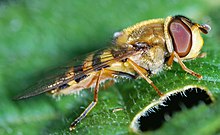Syrphus vitripennis
Appearance
| Syrphus vitripennis | |
|---|---|

| |
| Male | |

| |
| Female | |
| Scientific classification | |
| Domain: | Eukaryota |
| Kingdom: | Animalia |
| Phylum: | Arthropoda |
| Class: | Insecta |
| Order: | Diptera |
| Family: | Syrphidae |
| Genus: | Syrphus |
| Species: | S. vitripennis
|
| Binomial name | |
| Syrphus vitripennis Meigen, 1822
| |
Syrphus vitripennis is a very common European and North American species of hoverfly. Its larvae feed on aphids[1]
Description
[edit]For terms see Morphology of Diptera
Wing length 7·25-10·25 mm. Frons above lunulae black. Tergites 3 and 4 with entire yellow bands and lateral margin of tergites black. Male: femora 3 black for basal three-quarters. Female: femora 3 black on basal two-thirds. The male genitalia and the larva are figured by Dusek and Laska (1964).[2] See references for determination.[3][4][5][6]
Distribution
[edit]Palearctic throughout. Nearctic Alaska to California.[7][8] [9] Migratory.
Biology
[edit]Habitat: Deciduous and coniferous woodland and anthropophilic, occurring along field hedges, in suburban gardens and parks.[10] Flies March to October.
References
[edit]- ^ Stubbs, Alan E. & Falk, Steven J. (1983). British Hoverflies: An Illustrated Identification Guide. British Entomological & Natural History Society. p. 233, xvpp.
- ^ Dusek, J. & Laska, P. (1964) A contribution to distinguishing the European species of the subgenus Syrphus Fab. (Diptera, Syrphidae) according to the male genitalia and larvae. Acta Soc.Ent.Cechoslov., 61(1): 58-69.
- ^ Van Veen, M. (2004) Hoverflies of Northwest Europe: identification keys to the Syrphidae. 256pp. KNNV Publishing, Utrecht.addendum Archived 2017-02-07 at the Wayback Machine
- ^ Van der Goot,V.S. (1981) De zweefvliegen van Noordwest - Europa en Europees Rusland, in het bijzonder van de Benelux. KNNV, Uitgave no.32: 275pp. Amsterdam.
- ^ Bei-Bienko, G.Y. & Steyskal, G.C. (1988) Keys to the Insects of the European Part of the USSR, Volume V: Diptera and Siphonaptera, Part I. Amerind Publishing Co., New Delhi. ISBN 81-205-0080-6.
- ^ Coe, R.L. (1953) Diptera: Syrphidae. Handbks.ident.Br.insects, 10(1): 1-98. R.ent.Soc.London. pdf Archived 2018-10-04 at the Wayback Machine
- ^ "Fauna Europaea". Archived from the original on 2018-08-30. Retrieved 2017-01-21.
- ^ Peck, L.V. (1988) Syrphidae. In: Soos, A. & Papp, L. (eds.) Catalogue of Palaearctic Diptera, 8: 11-230. Akad.Kiado, Budapest.
- ^ Vockeroth, J. R. (1992). The Flower Flies of the Subfamily Syrphinae of Canada, Alaska, and Greenland (Diptera: Syrphidae). Part 18. The Insects and Arachnids of Canada. Ottawa, Ontario: Canadian Government Pub Centre. pp. 1–456. ISBN 0-660-13830-1.
- ^ Speight, M.C.D. (2011). "Species accounts of European Syrphidae (Diptera)" (PDF). Syrph the Net, the Database of European Syrphidae. 65: 285pp. Archived (PDF) from the original on 2016-03-04. Retrieved 2017-01-31.
